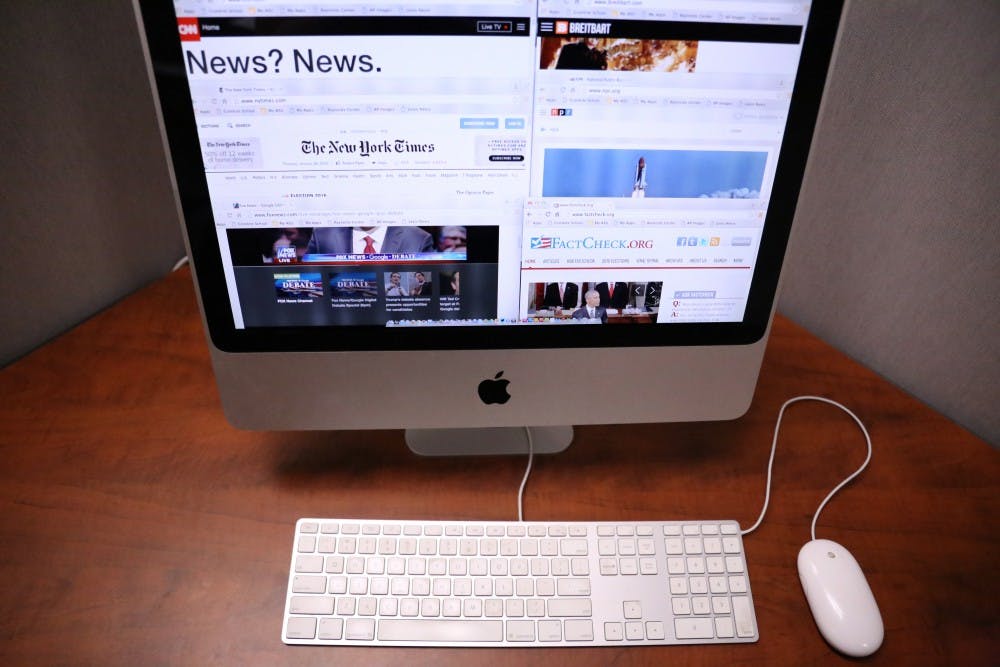A very simple, lazy critique of so-called "millennials" is that young people are on their phones too much, and that we engage in social media far too often. While we must be conscious of how we spend our energy and time, I think there should be a rebuttal to this sentiment.
A very famous anonymous artist, Banksy, comes to mind as the leader of the sentiment that we are a more detached and morally decayed society because of phones and social media. He often critiques the idea of social media being so relevant in people’s lives, and while he is free to do so, he glosses over the importance of social media in our lives.
There have been countless videos demonstrating the dangers of being on Facebook and the emptiness of Twitter and Instagram. There is this notion that all of our self-worth is put into these so-called vices and as a result, makes us feel emptier and more hollow inside. However, this notion disregards the fact that self-worth before the digital age was never emphasized in schools, or paintings, or sitting outside and watching birds, or whatever it is that some Elite Daily article tells us to do instead of hollowing our hearts out on the internet.
People were still feeling detached before Instagram, and were still looking for validation. Doing activities that don’t involve your phone does not combat these feelings; it’s a separate issue. With that said, there are many self-help chat rooms that offer advice and help for people, for free. There are chat rooms like BlahTherapy.com, where one can sign up as either a "venter" or listener and connect with someone anonymously.
We tend to forget that the Internet opens doors of communication that were simply unfathomable before its creation. By being able to understand others from all around the world, we are more sensitive toward their feelings and perceptions and do not condone making fun of them, or speaking ill of them.This is often described as creating "political correctness," the term that racists coincidentally despise. Politically, outlets like Twitter have revolutionized the way we consume news. In seconds, a news story can go viral, and in seconds, you can speak about it with someone across the globe. People finally have a platform to discuss the countless events that grab peoples attention, from the Arab spring to exposing police brutality.
Of course, there is nothing more repulsive than offensive Internet comments, but the people behind them exist in "real life." If Don Lemon, a journalist for CNN, says something others disagree with or want more exposure on, he will most likely address it on air. Never before have we lived in a time when someone sitting at a coffee shop can tweet his or her feelings on a subject and have it go viral with support or distaste — a thought for the world to think about, discuss and write articles on. The articles that critique our generation's Internet use are published online, meaning people must read them on their phones or laptops and often times on social media.
Not only does social media allow its users to question the news, it forces the world to pay to attention to news stories that may not be as exposed. Recently, thanks to Humans of New York, a blog featuring interviews and portraits taken on New York City streets, millions are aware of the refugee crisis and other countries on a personal level. Brandon Stanton, the photographer, posts the exact quotes from conversations with his subjects and helps spread awareness about others. Without his photographs being posted online, refugees or people in need would not have gotten help or exposure.
Being on the Internet not only helps with this sort of political and social exposure, but also with helping people on the fringes of society feel connected with others. Yes, I will put my phone down when necessary and turn off my social media apps, but I will not neglect the creative, social and political platform it gives us.
Related Links:
The Internet at 25: Out with the park, in with the chatroom
The Millennial mindset: A real chance for hope and change
Reach the columnist at anshakoo@asu.edu or follow @ashak21 on Twitter.
Like The State Press on Facebook and follow @statepress on Twitter.
Editor’s note: The opinions presented in this column are the author’s and do not imply any endorsement from The State Press or its editors.
Want to join the conversation? Send an email to opiniondesk.statepress@gmail.com. Keep letters under 300 words and be sure to include your university affiliation. Anonymity will not be granted.




